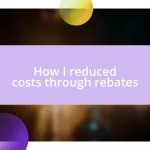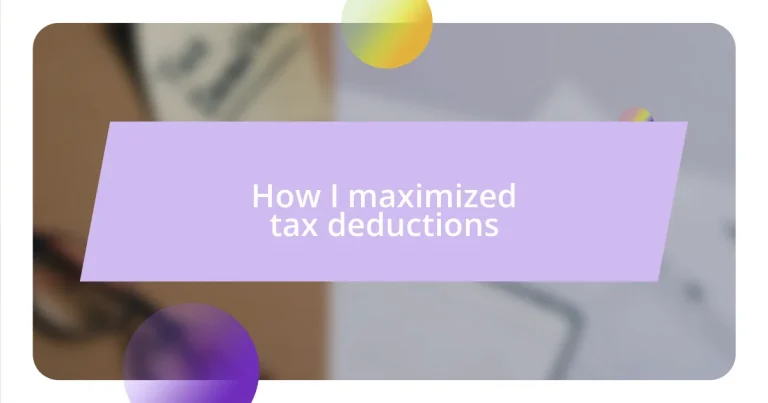Key takeaways:
- Identifying and organizing deductible expenses can significantly reduce taxable income, enhancing financial awareness and control.
- Utilizing tax software and consulting with tax professionals can uncover overlooked deductions and provide strategic financial guidance.
- Regularly reviewing past deductions helps in recognizing missed opportunities and prepares for future tax planning, fostering proactive financial management.
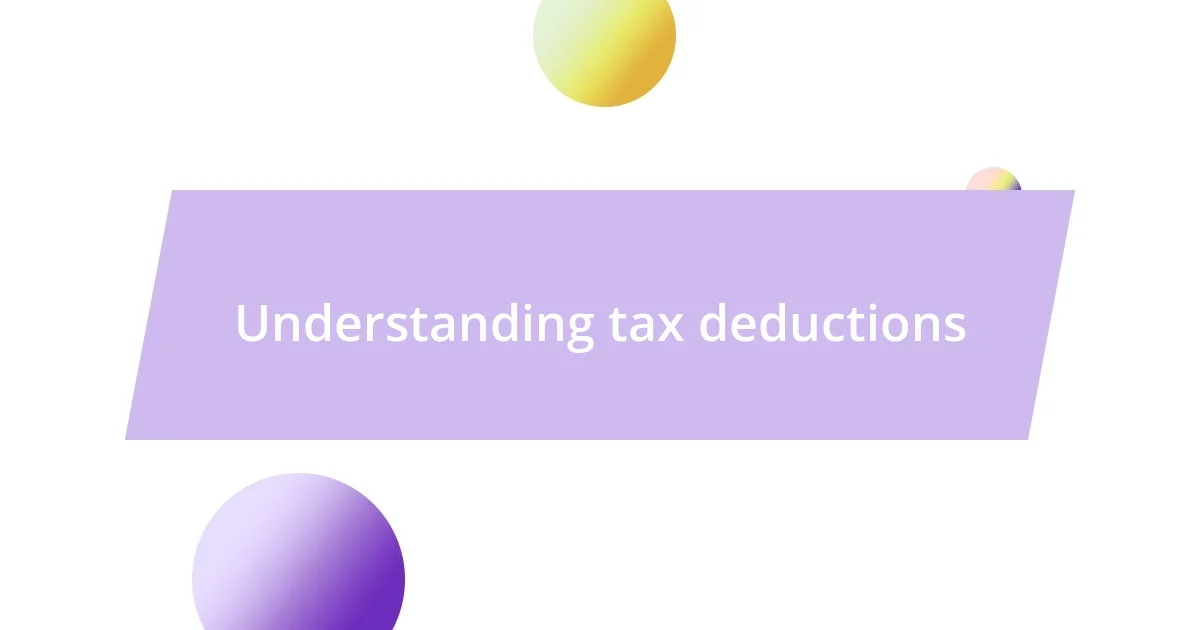
Understanding tax deductions
Understanding tax deductions can feel like navigating a maze, but it’s crucial for anyone eager to maximize their savings. Reflecting on my own journey, I remember the first time I tracked my eligible expenses—expenses I never thought could be deducted. It was like discovering hidden treasure; each receipt saved led to a sense of empowerment as I calculated how much I could legitimately subtract from my taxable income.
Have you ever felt overwhelmed by the sheer number of tax rules? I certainly have. It took me a while to realize that not all deductions are created equal. Some are straightforward, like donating to charity, while others, such as business-related expenses, require more documentation and attention to detail. I learned that knowing the specifics and keeping organized records made the process less daunting and far more rewarding.
As I delved deeper into tax deductions, I found that they weren’t just boring numbers; they represented my hard work and achievements throughout the year. For instance, when I applied for a home office deduction during the pandemic, it was incredibly satisfying to see how my everyday expenses could be transformed into financial relief. It’s moments like these that make me appreciate the intricate dance of financial management and tax planning. Are you ready to explore how you can turn your expenses into deductions?
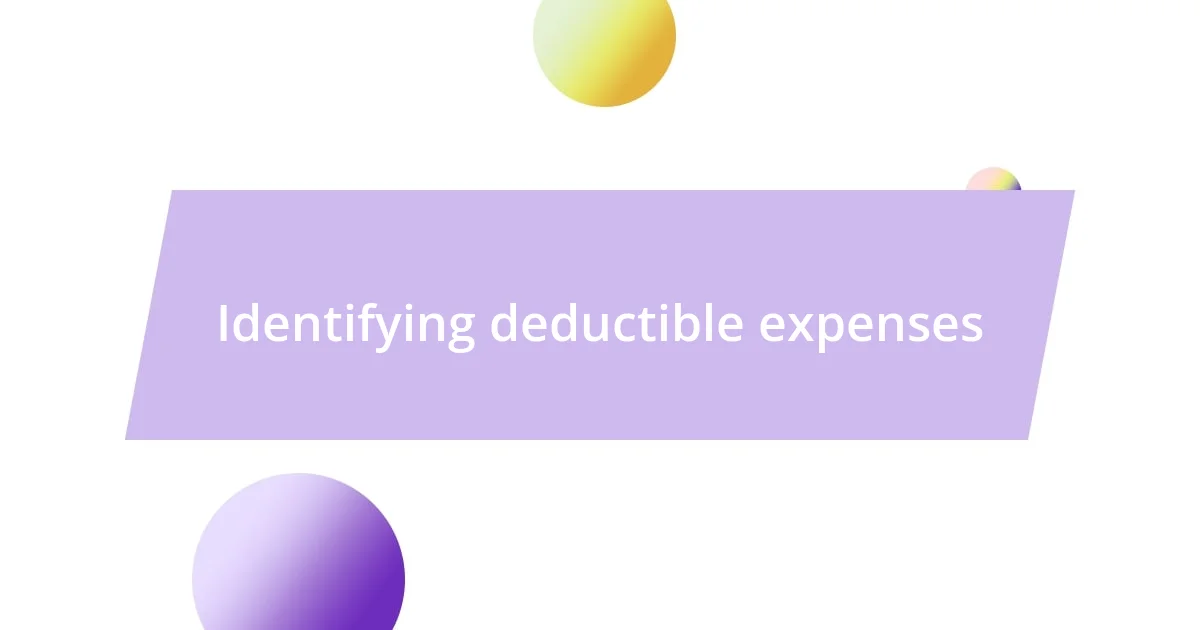
Identifying deductible expenses
Identifying deductible expenses starts with a keen awareness of where you spend your money. I remember sitting down with a pile of receipts, realizing how many expenses I could categorize differently than I had before. Each time I identified a deductible expense I hadn’t previously considered, it felt like I was gaining a powerful insight into my spending habits—almost like having a personal finance coach guiding me.
One of the most eye-opening experiences for me was discovering the potential deductions related to my side hustle. I vividly recall the first time I calculated the costs for supplies and travel. These weren’t just expenses but investments in my passion, and recognizing that they could reduce my tax burden made the hustle even more worthwhile. It’s amazing how clarity around deductible expenses can transform your perspective on spending.
To effectively identify deductible expenses, it’s essential to maintain accurate records throughout the year. I learned that regularly updating a simple spreadsheet made all the difference. After calculating my deductions, I felt a sense of accomplishment, knowing I had maximized my available savings. By paying close attention to the details, like noting mileage for work-related travel and saving every receipt for business-related purchases, I was able to create a clearer picture of my finances. This practice not only simplified tax preparation but also helped me align my expenditures with my financial goals.
| Deductible Expense | Description |
|---|---|
| Charitable Contributions | Donations to qualified organizations can often be deducted, allowing you to benefit your community while reducing taxable income. |
| Home Office Expenses | If you use a portion of your home exclusively for your business, you may deduct related expenses like utilities and rent. |
| Business Supplies | Costs for items necessary for running your business, such as office supplies, can decrease your taxable income significantly. |
| Travel Expenses | Expenses incurred while traveling for business, including lodging and meals, can also be deducted, helping you recoup costs associated with your work. |
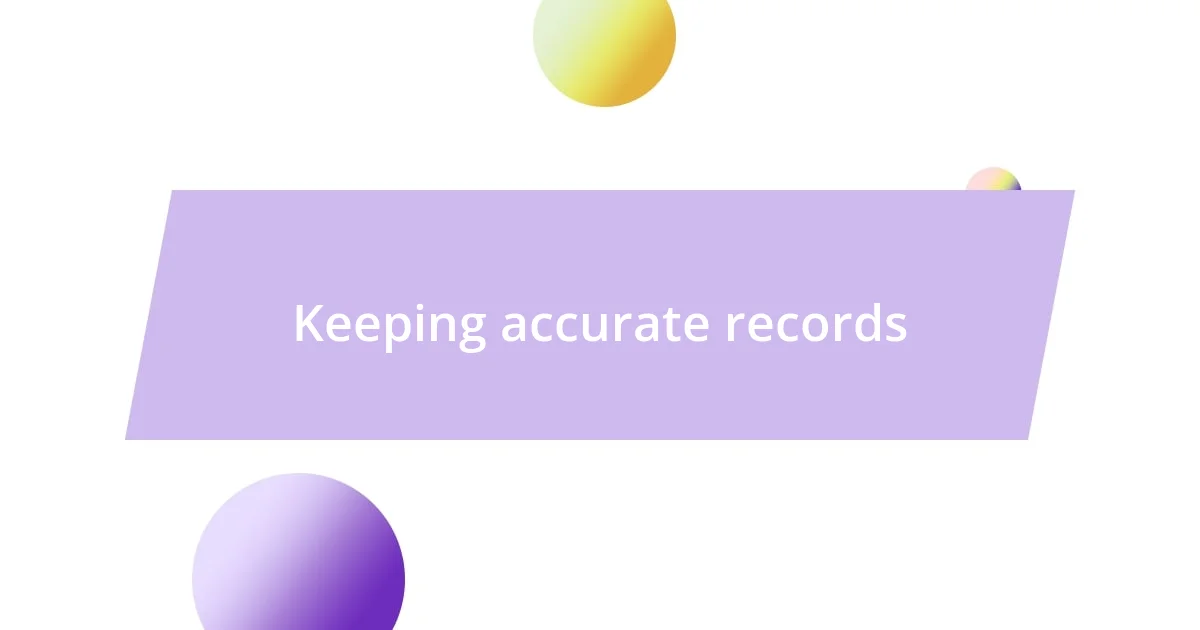
Keeping accurate records
Keeping accurate records is foundational to maximizing your tax deductions. I recall a hectic tax season when I neglected record-keeping, thinking I could rely on memory. That didn’t turn out well; I ended up missing deductions that could have saved me substantial money. Now, I view record-keeping as an ongoing ritual rather than a chore—it creates clarity and peace of mind, knowing I’m prepared come tax time.
To stay organized, I developed a system that I swear by. Here’s a quick list of strategies that really work for me:
- Set Up a Dedicated Space: I have a filing cabinet just for my tax documents. This makes it easy to find things when I need them.
- Use Digital Tools: Apps like Expensify or even a simple Google Drive folder allow me to track expenses instantly.
- Monthly Check-Ins: I set reminders in my calendar to review receipts and update my records, so nothing falls through the cracks.
- Categorize Expenses: I sort my receipts into categories, like medical, business, and personal deductions, making retrieval simpler.
- Keep Notes: I jot down details on receipts, like the purpose of the expense. This saves confusion later on when I’m compiling everything.
By adopting these habits, I feel more in control of my finances, and that only enhances my confidence when filing taxes. It’s a small change in approach, but it has made a world of difference in my experience.
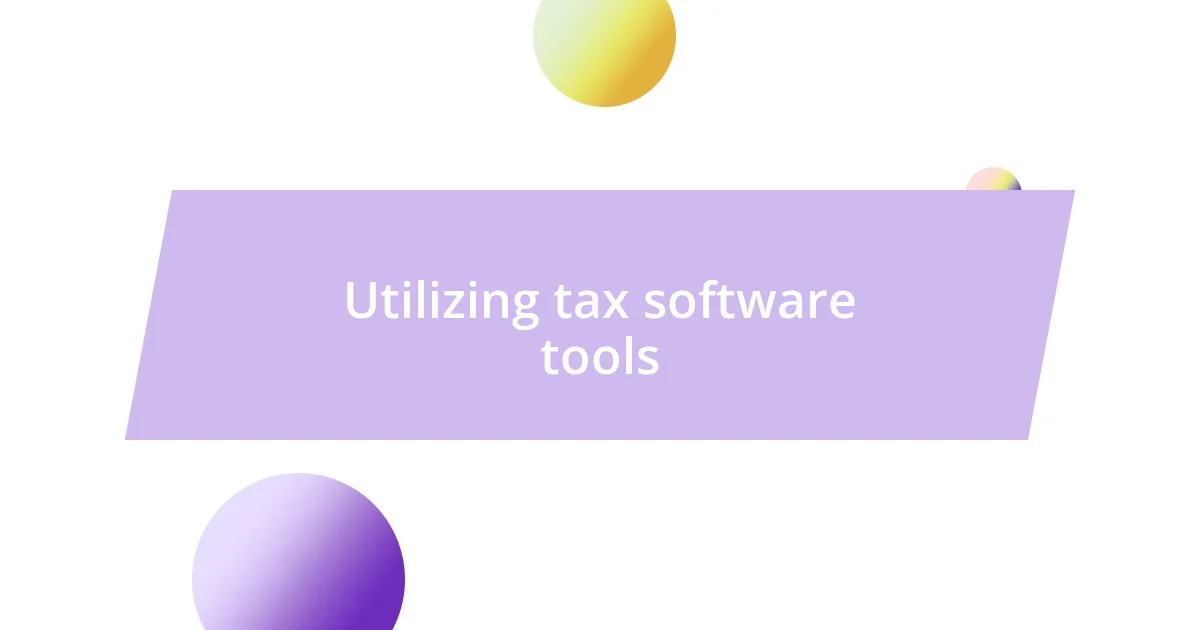
Utilizing tax software tools
Utilizing tax software tools has transformed my approach to tax deductions, making the entire process feel more manageable and less daunting. I remember my first experience with tax software; it was a revelation! The software not only guided me step-by-step but also prompted me to think of potential deductions I hadn’t considered. It felt as if I had a virtual tax assistant helping to uncover savings right at my fingertips.
One feature that particularly stood out for me was the ability to import financial data directly from my bank accounts. At first, I was skeptical. Would it really be that seamless? But once I tried it, I was amazed by how much time I saved—not to mention the accuracy it provided. This automation allowed me to focus more on understanding my tax situation rather than getting lost in piles of paperwork. Have you ever experienced a moment where technology just clicks? That was it for me.
Additionally, many tax software tools come equipped with real-time feedback on how changes in your data affect your deductions. This was an eye-opener—I could see the impact of adjusting certain entries instantly. I distinctly recall adjusting some business expense inputs and watching my potential refund increase. It was exhilarating! It’s fascinating how technology can empower us to maximize our savings and increase our financial literacy in the process. When was the last time you felt empowered about your finances? For me, it’s been a game-changer.
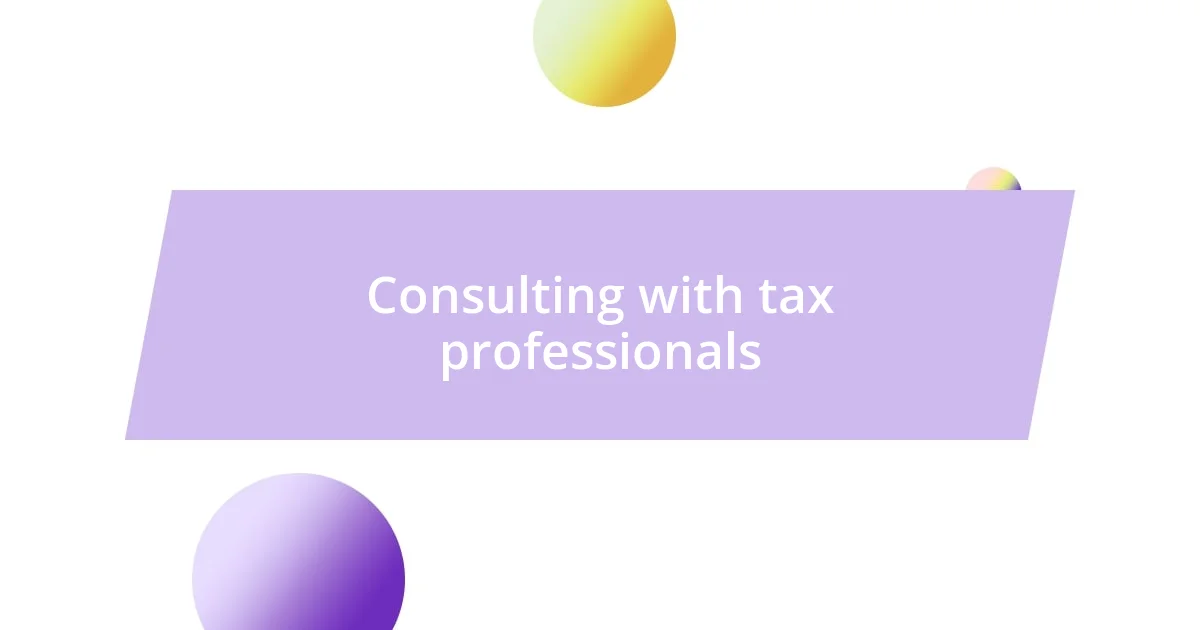
Consulting with tax professionals
Consulting with tax professionals has proven to be one of the most valuable steps in my journey to maximize tax deductions. I distinctly remember my first meeting with a tax advisor; it felt a bit like stepping into a maze with a guide for the first time. Their expertise not only helped me uncover deductions I had overlooked but also provided reassurance, knowing I wasn’t navigating these complex waters alone. Don’t you think having that kind of support can make a huge difference?
One of the standout moments for me was when my tax professional explained the nuances between standard and itemized deductions. It was enlightening! Understanding how these options can significantly impact my tax return opened my eyes to strategic planning I could do throughout the year. After that, I made it a point to consult regularly, and it was fascinating to see how proactive guidance could lead to tangible savings. Have you ever wondered if a simple chat might reveal money left on the table?
Moreover, I found that tax professionals often have access to up-to-date information and strategies that are not easily available to the average taxpayer. For instance, during one consultation, my advisor mentioned credits for continuing education, which I had no idea existed. This sparked a flurry of excitement as I realized I could potentially save thousands! It’s in these candid discussions that I believe the real power of consulting with a tax expert lies—unlocking insights that personal research simply can’t match. How empowering does it feel to turn knowledge into savings? For me, it’s been transformative.
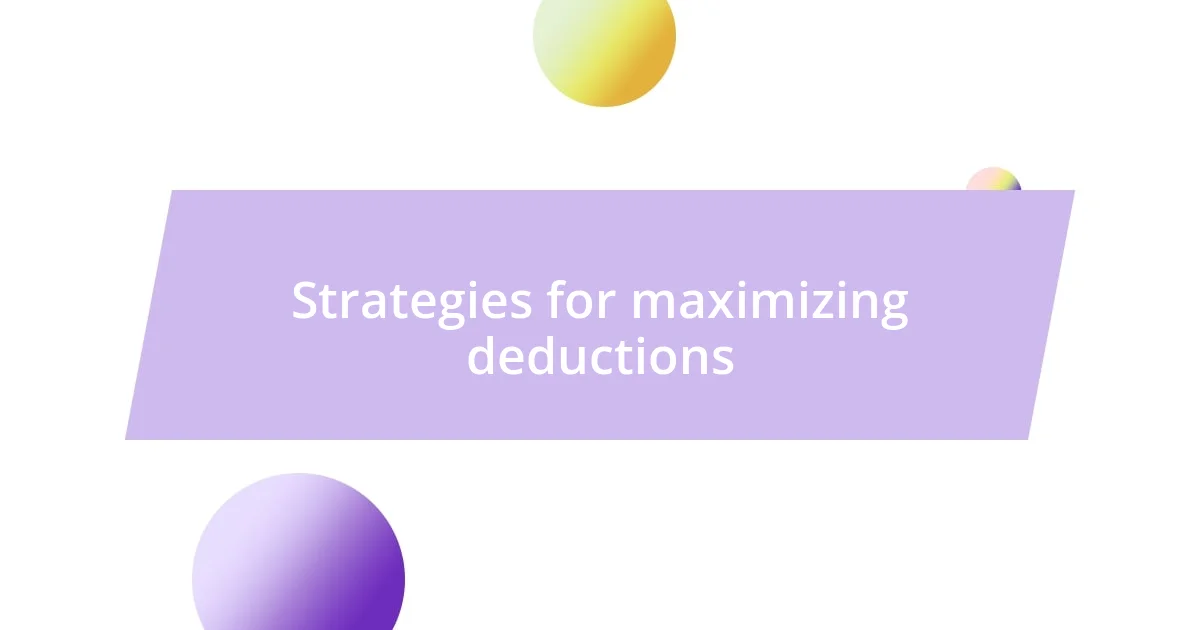
Strategies for maximizing deductions
Identifying overlooked deductions can make a significant difference in your tax return. There’s something incredibly satisfying about scouring through receipts and documentation to find potential deductions you might have missed. I’ll never forget the time I was organizing my expenses and stumbled upon an entire folder of charitable contributions. It was such a rewarding experience, realizing those donations could lower my tax burden! Have you ever found a hidden gem in your records? It turns out our everyday activities often hold more savings than we realize.
One effective strategy that has worked wonders for me is creating a dedicated expense tracker throughout the year. I started using a simple spreadsheet, and it drastically changed how I viewed my finances. Tracking my expenses in real-time not only kept me organized but also nudged me to stay mindful of spending habits that could qualify for deductions. Plus, when tax season rolled around, the information was readily available, and I felt an incredible sense of control. Isn’t it amazing how a small shift in your routine can lead to such big wins?
Participating in tax workshops or seminars can also be an invaluable resource. I once attended a community tax seminar that opened my eyes to various deductions tailored to my profession. The excitement in the room was palpable as we shared tips and experiences. I walked away not only with newfound knowledge about business expenses but also with a network of fellow taxpayers eager to share strategies. It was a reminder of the power of community and collaboration—all while working towards maximizing those deductions. Have you made connections that enhanced your understanding of something as complex as taxes? I encourage you to seek out these opportunities!
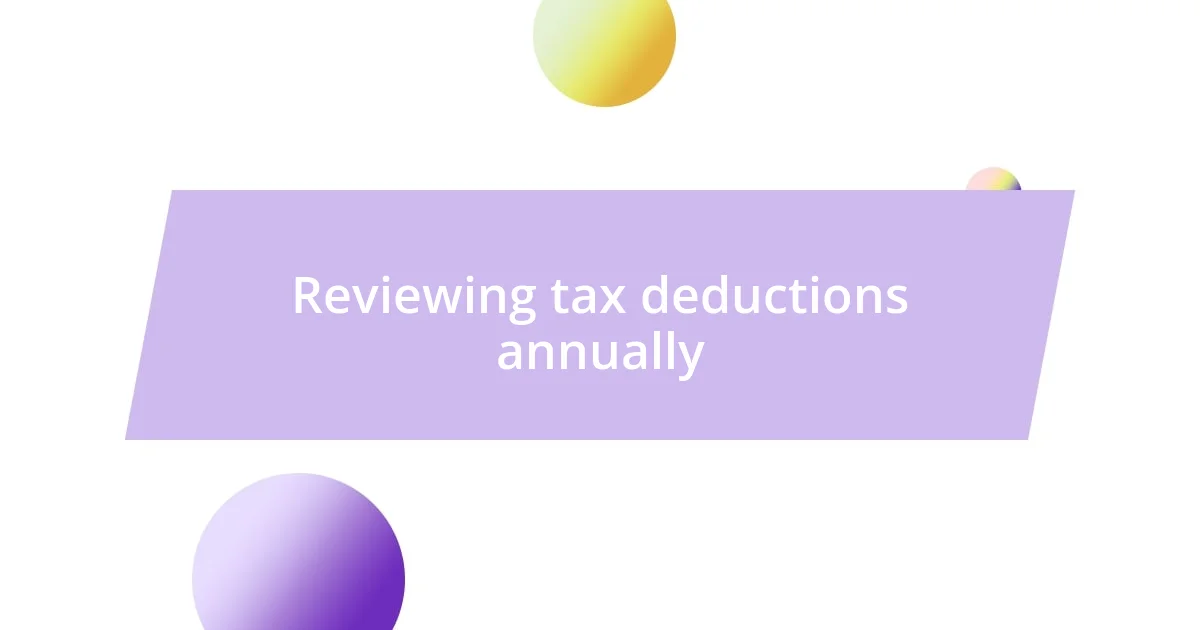
Reviewing tax deductions annually
One annual ritual I find incredibly beneficial is taking the time to review all my tax deductions. I remember sitting down with my laptop, coffee in hand, and diving into last year’s tax returns. As I revisited each deduction, I felt a sense of empowerment wash over me. It’s like re-examining a treasure map; sometimes, you’ll notice details you missed before. Isn’t it fascinating to think how a small adjustment could lead to significant savings?
During one of these annual reviews, I happened upon a health expense I’d completely forgotten about. It was a surprise that turned my frustration into excitement. I had been diligently tracking medical expenses throughout the year, but life got busy, and I almost let that deduction slip away. That experience reiterated to me how easy it is to miss opportunities if we don’t stay consistent. Have you ever had a moment where revisiting your records brought clarity and relief?
This annual check-in doesn’t just save money; it also prepares me for the future. By understanding my past deductions, I can better anticipate potential changes in my financial situation. Reflecting on my circumstances from the previous year has allowed me to adjust my budgeting strategy to minimize taxes proactively. It’s almost like building a roadmap for the future—one that can help clarify my financial goals. Who wouldn’t want that kind of foresight, right?










